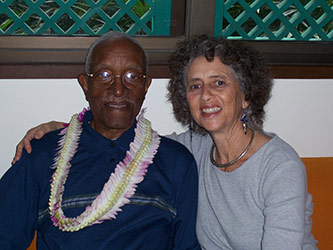Miriam Sharma '62

Miriam Sharma '62
Emerita Professor, Asian Studies, University of Hawaii at Manoa
In what ways do you feel your major in history helped to prepare you for your current career? Are there any skills that you developed as an undergraduate history major that are essential to your work? And can you give us an example (or examples) of this?
There is no doubt about the seminal importance of my major in history. It, along with my studies in London, provided a foundation for completing my M.A. in history at the University of Virginia, and while I went on to a Ph.D. in anthropology and post-doctoral work in political economy, history remains the core of my intellectual endeavors in teaching and research. Looking closely and critically at the sources with an open and questioning mind is a key skill I acquired. Somewhere, along the way, it also taught me to question received wisdom and try to hear silenced voices. Perhaps a key example of this is how my courses are always rooted in history and try to both question and present alternative views to those that dominate in academia.
Are there any other reflections on your history major or time in the History Department that you'd like us to include in your spotlight?
In fall 1957, I entered Brooklyn College—a little over 16 and a half years—after being a member of the first graduating class of Wingate High School in Crown Heights. My life until then was very much constricted by the ghettoized environment of the 1940s and 1950s. Brooklyn College introduced me to a new world of knowledge and exciting friendships in which my history major played a critical role—opening new horizons.
Which history course or courses were particularly meaningful to you during your time as a history major and/or have had a lasting influence? Why?
A large and fascinating lecture class of required "Western Civilization" in my first semester sparked my interest in history and that became my major field of study. Most memorable teachers were Professors Mary Francis Giles and Dr. Ann Burton; the former taught Roman history with led me to focus on Greek and Roman history as a junior study abroad student at University College London. The latter worked with me on an intensive independent reading course on British history that allowed me to complete my major requirements. But most memorable of all was Professor John Hope Franklin who had come to Brooklyn College as the chair of the History Department in 1956.
After returning from London, I took Professor Franklin's course "Civil War and Reconstruction," writing my final research paper (completed at the 42nd Street Library—not Wikipedia!!) on "Pro-Slavery Arguments in the Old South." That course was pivotal in cementing my interest in history as well as a lifelong friendship with him. I still have that paper with Professor Franklin's comments. He said he would like me to be an honors student in history; unfortunately, as I was due to graduate that did not permit further courses with him. Yet, somehow—I have never quite figured out why—this one student out of thousands enrolled at Brooklyn College at that time, remained closely linked with John Hope over many years until his passing in 2009.
If I write so much about John Hope as a memory of my time at Brooklyn College over 50+ years ago, it is because my educational and intellectual experiences with him epitomize the key role the History Department played in helping to form my very personhood and ultimate academic goals of my future life. The courses taught by history faculty, as well as its other faculty, were demanding and challenging and gave me the tools with which to pursue knowledge in and outside academia that was imbued with critical thinking—before the term became a buzzword of today.






